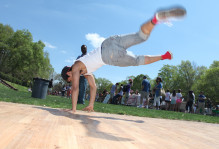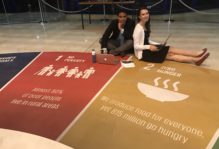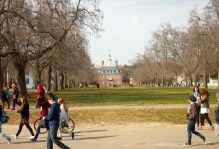A trip to China
Wow, what a crazy five weeks! I’ve just returned from William and Mary’s guinea pig service trip to China. If you’re interested, read on! It’s a pretty long post, and I know we’ve all got short attention spans, so I’ve done some highlighting to make it easier to read.
So, what’s this trip about? Well, there were six of us William and Mary students and another girl from Madison Wisconsin, and we stayed in one room at a local migrant worker school for five weeks, teaching English at three elementary schools during the weekdays, mostly vowels and pronunciation. On weekends, we tutored adults, including some of the English teachers at these elementary schools who had less-than-perfect pronunciation, and we also tutored and played games with some of the kids.
The village we taught at was called Sha He. It’s probably the poorest village in the Beijing area. There was no sewage or garbage disposal system, and the village was so crowded with people and dogs that there was trash everywhere, and the entire village had a distinctive stench. We were lucky that the room we lived in had electricity, so we had a fan, light, and a water boiler. We shared a sink with the community for washing veggies, clothes, and ourselves. Every so often, we’d treat ourselves to a bath at the local bath house. The bathroom was several holes in the ground, and there would always be lots of flies, mosquitoes, and maggots buzzing around. Luckily, we adjusted easily, and the maggots even became entertaining. It was like a game to see if you could finish doing your business before the maggots climbed onto your shoes.
Harsh living conditions aside, the people of Sha He were extremely nice! It’s a pretty small village, so everyone knows each other. We were regulars at a couple of restaurants, and our favorite was a homemade noodle place because the noodle lady was so sweet. Once, we were eating at an outdoor restaurant next to hers, and she saw that we didn’t have enough chairs and was kind enough to relocate some chairs from her shop so we could sit down. Sometimes at night, we would browse the little shops, and the shopkeepers were all very sweet. I bought two shirts at one store, and the next time I went back, she asked me if those two shirts fit okay, and we had a conversation about our hometowns. The kids were wonderful! There were a couple of girls who lived at the same school that we did, and their parents didn’t get home from work until eight at night, so they’d always ask me to play, and I spent hours with them jumping rope, sharing stories, playing tag, having my hair braided…sometimes I’d be really exhausted coming home from teaching, and they’d want to play. I’d want to sleep, but I’d think about how these girls don’t really have parents since their parents are always working, and they think of me as their big sister. One of the girls mentioned her dad was really sick and in the hospital, but she wouldn’t give me details. She just smiled and said, “don’t worry, he’s almost better!” I’m truly humbled by these kids. I’ve learned a lot from them, and I hope I’ve done the same for them!
We had dinner with the non-profit organization we worked with, Zigen, three or four times a week. The teachers we worked with most were Chen Ying, Shi Laoshi, Li Laoshi, and Yu Leping. Chen Ying was unlike anyone I’ve ever met. When you first meet her, you think she’s like a little boy. She’s not even five feet tall, small-framed, has just a fluff of short hair on her head, and is hyperactive like a ten year old. But in the five weeks I got to know her, her story was revealed bit by bit, and it’s truly inspirational. Chen Ying grew up with two sisters in a very poor family. Because her parents couldn’t afford to take care of three children, they sold both of her sisters, but no one wanted to buy Chen Ying because she wasn’t an attractive child and blind in one eye. Well, as she grew older, she had to find a living for herself because her parents couldn’t support her anymore, so she was an extra in several films, and she slept in parks and underground walkways at night. In her later teenage years, she suffered a severe bout of depression. I learned of this when I asked her what the characters on her arm were. Turns out, she tattooed the characters for “kill,” “torture,” and “hate” on her arm herself using a hot needle and blue ink. Zigen turned her life around. When Chen Ying joined Zigen, they gave her a home, a room to stay in and a community. She discovered the healing properties of service, and now she teaches ethics and life classes at eleven migrant worker elementary schools. Her students all love her!
The whole trip provoked me to think a lot more about service. When I went to Newark for my spring break service trip, everything was organized for my group, and I didn’t really think about how much I was impacting the community I was serving. This trip was different. Pioneering a trip across the globe makes you think so much about just how you’re helping the community at risk and what you can do to make it more effective. How much of a difference can teaching English for five weeks really make? Should we instead do tutoring sessions? Should we teach their teachers? What would be most sustainable? What if we hired local teachers? What projects can we do there? What does their community really need? Can we provide medical aid? These are just some of the questions my teammates and I have discussed. Since we’re a student-run service trip, we have to plan these things ourselves, and I’ve learned so much from it!
Besides service, I also did a linguistics study on Chinese language acquisition. It’s funded by a grant from the school! You can read more about the fun research my friends and I are doing this summer! Thanks for reading!
P.S. I randomly ran into my friend Isshin at a metro station in Beijing near the Silk Market, a giant market where you can bargain like crazy and get awesome stuff for cheap! You can read about his experience studying abroad in Beijing.




No comments.
Comments are currently closed. Comments are closed on all posts older than one year, and for those in our archive.